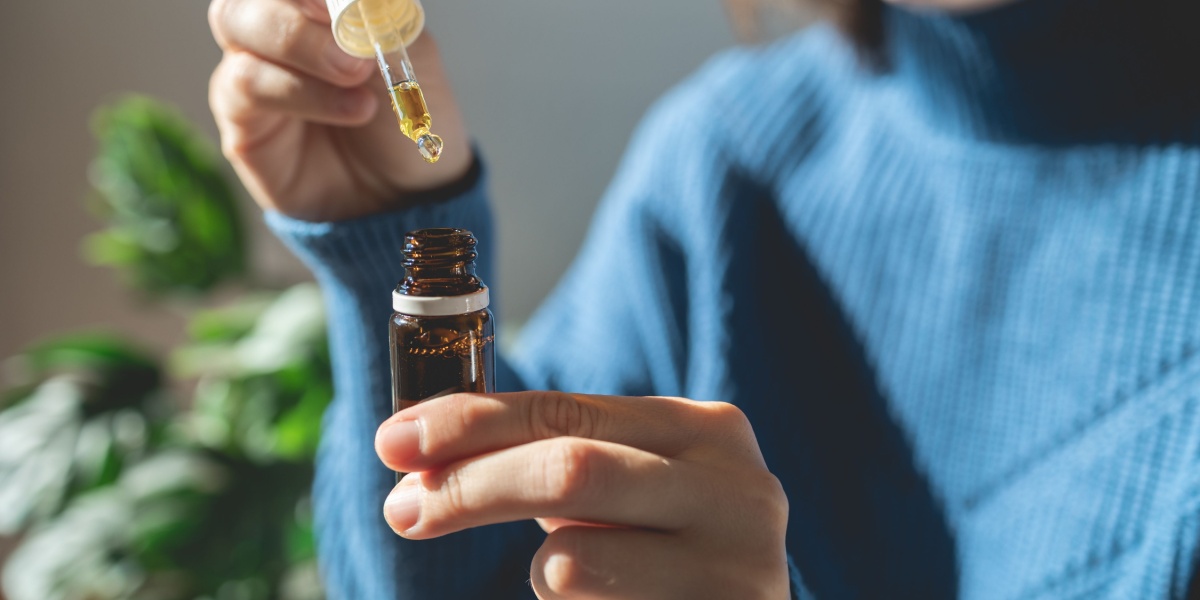Alcohol is one of the most commonly consumed drugs in the world. But its ease of accessibility means it is also one of the most abused drugs, with close to 30 million Americans suffering from Alcohol Use Disorder (AUD). [1] Recovery from AUD can cause challenging cravings, making relapse very common. However, a recent study has found that cannabidiol (CBD) significantly reduced cravings in this group, which could pave the way for more effective AUD treatment soon. [2]

How CBD might work in the brain
The exact way CBD works in the brain isn't fully understood yet, but researchers believe it affects several different brain pathways. [3] Studies show that CBD can interfere with how certain brain chemicals bind to receptors in systems involved in reward and pleasure (the opioid and dopamine systems). [3] This can reduce the activity of these reward pathways, which may explain why CBD helps treat alcohol misuse. [3]
CBD can also work on GABA receptors in the brain, alongside reducing brain reactivity in several regions of the brain, which may contribute to its anti-anxiety effects. [3] MRI scans, PET scans, and EEGs have all been used in studies into CBD’s effects, with most confirming an alteration in brain function compared to baseline. [3] These widespread effects mean that CBD has the potential to have a clinical application in a wide spectrum of both mental and physical health issues, including substance misuse, anxiety, epilepsy, and chronic pain. [3]
What the ICONIC trial did
Although Alcohol Use Disorder is so prevalent, only a few medications are available for its treatment. [2] The ICONIC trial aimed to address this by investigating the effects of CBD in this group. Pre-clinical data suggested that CBD could help in AUD treatment due to its anti-craving and stress-reducing properties. [2] The ICONIC trial, conducted in Germany, was a randomized double-blind trial evaluating 28 individuals with AUD and a control group. [2] Outcomes included activation of the brain’s reward system from alcohol-related cues, alcohol cravings, and CBD levels in the blood. [2] The trial group received 800mg of CBD, with the control group receiving a placebo.
The study found that the people taking CBD showed less activity in the brain’s reward system, which is linked to cravings, and also reported much weaker urges to drink alcohol when exposed to stress and alcohol-related triggers (like seeing a beer bottle). [2] The study also found that the higher the CBD level in their blood, the less the individuals craved alcohol when exposed to these triggers. [2] But what do these results mean for AUD treatment?
Key findings explained
The study specifically looked at a brain region called the nucleus accumbens, which is part of the reward system. [2] Researchers were able to evaluate the activation of this region from alcohol-related cues and stressors. [2] CBD was found to reduce this activation, meaning this group experienced fewer cravings to consume alcohol when exposed to alcohol-related cues.
The study also suggests that the higher the levels of CBD, the greater the reduction in cravings, although it is not yet clear what the maximum safe dose of CBD would be in this group. These results are very promising and could open the door to further research into the use of CBD for AUD treatment.
What does "reduced brain reactivity" actually mean?
Reduced brain reactivity means the brain responds less strongly than usual to certain triggers. In people with Alcohol Use Disorder, things like seeing alcohol or being in certain situations that they associate with alcohol can activate the brain’s reward system and cause strong cravings.
However, this study found that CBD dampened these brain responses. So when these individuals encountered their usual drinking triggers, their brains didn't react as intensely, and they experienced fewer cravings.
Implications for recovery
These study results are very promising and indicate that CBD could play a key role in future AUD treatment. Reduced alcohol cravings will result in less risk of relapse in this group, and therefore a higher proportion of people having a successful long-term recovery. It could also mean that daily living is easier for this group, without having to avoid triggers so meticulously. This could benefit millions of people in the United States alone. However, this study is not perfect, and further research is needed before CBD becomes a mainstay in AUD recovery treatment.
Limitations and what's next
The main limitation of this study is that the sample size was small, with only 28 participants, so it’s difficult to apply these results to larger population groups. There is also limited information on certain demographic factors, such as the ethnicity of participants and how this impacted their response to CBD, again making the results difficult to apply on a wider scale.
However, given the initial positive results of this study, this should be followed up on. The next steps would involve larger studies with more participants, with a range of ages, ethnicities, and other demographic factors, to see if the results can be applied to the wider population.
CBD and alcoholism: What should patients & families know?
While CBD is derived from the cannabis plant, it does not cause a ‘high’ and is not addictive. It’s legal and readily available throughout the United States, with varying restrictions on its use in certain states. [4][5] In a recent report, the World Health Organization did not identify any public health issues associated with pure CBD use. [6]
The regulation of CBD is overseen by the Food and Drug Administration (FDA). The FDA has approved Epidiolex, a CBD-based medication for seizure disorders; however, they have not approved CBD use as a dietary supplement. While generally considered safe to use, CBD can cause several side effects, especially if a high dose is consumed. These include: [7]
- Dry mouth
- Diarrhoea
- Lethargy
- Lightheadeness
- Liver problems
If you, or someone you know, is curious about trying CBD, it’s important to consult with a medical professional first. This is especially important if you have underlying health problems or take regular medication, as CBD can interfere with several medications, including blood thinners, antiepileptics, and antidepressants. [8] It’s best to start at a low dose, around 10-25mg per day, and then increase as needed depending on the individual response. However, CBD is generally not recommended for the following people: [7]
- Pregnant women
- Children
- Those with liver problems
- Those taking interacting medications
Final thoughts
New research from the ICONIC trial has shown that CBD can be effective in the treatment of Alcohol Use Disorder, a finding that is likely to positively impact future treatment regimes. However, further research is needed before CBD becomes readily available for this purpose. If you are curious about starting CBD, please consult with a medical professional.


-blog-detail.jpg?v=1722513369)
-blog-detail.jpg?v=1722513348)
